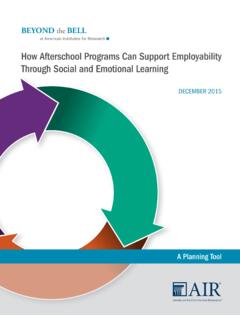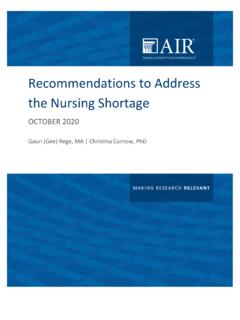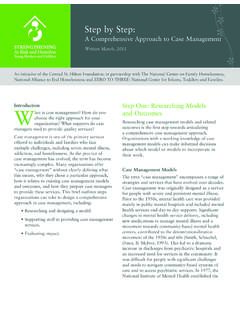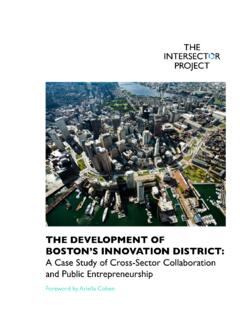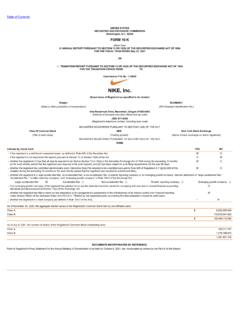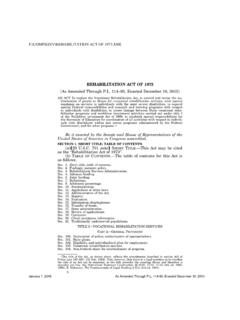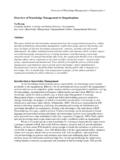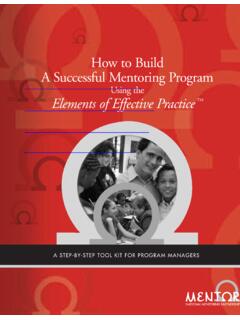Transcription of Effective Strategies for Mentoring African American Boys
1 MONTH YEAR Effective Strategies for Mentoring African American Boys G. Roger Jarjoura, Principal Researcher, Human and Social Development JANUARY 2013 011 Human and Social Development Effective Strategies for Mentoring African American Boys January 2013 G. Roger Jarjoura 1000 Thomas Jefferson Street NW Washington, DC 20007-3835 | TTY Copyright 2013 American Institutes for Research. All rights reserved. American Institutes for Research Effective Strategies for Mentoring African American Boys 1 Introduction This brief provides a look at the ways that Mentoring programs may effectively serve African American boys.
2 First, we present a list of promising programs that have been shown to effectively address the unique needs of African American boys, contributing to positive outcomes. These programs collectively inform our beliefs about how best to serve this population when Mentoring is at least one part of the overall strategy. We have organized this information around core principles relevant to the design and implementation of Mentoring initiatives for African American boys. The brief also considers the implications for practice, particularly for those youth in the child welfare system.
3 Promising Programs There are very few Mentoring programs that have been the subject of rigorous scientific evaluations that put them on the published lists of evidence-based practices. Yet, there are programs for which there is empirical evidence that the youth participating in the programs do better as a result: these young people are more likely to stay in school and attain higher levels of educational success; they are less likely to participate in gangs, less likely to be involved in substance abuse, and less likely to be involved in delinquency and the juvenile justice system.
4 For African American boys, a list of promising programs includes: As part of the Harlem Children s Zone, A Cut Above is an after-school intervention that provides academic assistance, preparation for high school and college, and leadership development. Students are assigned mentors (called Student Advocates) who are trained to advocate on their behalf with teachers, parents and school administrators. In addition, Peacemakers Boys to Men Leadership is a gender-specific initiative focusing on civic engagement and community service, and with a goal to prevent substance abuse and reduce involvement in gangs and school violence.
5 ( ) House of Umoja, based in Philadelphia, has been providing services to youth for nearly 40 years. Initially founded to prevent youth from becoming gang-involved, this program is based on an African kinship model and has been recognized for its efforts to reduce gang violence in Philadelphia. This is a residential Boystown model that includes on-site job training, employment and entrepreneurial programs to residents. ( ) The Mentoring Center, based in Oakland, California, offers its developers have coined to be Transformative Mentoring .
6 This program involves a structured curriculum that offers a long-term group Mentoring program. Key components of the curriculum focus on character development, cognitive restructuring, spiritual development, life skills training, anger management, and employability skills. The primary audience is youth of color, who are perceived to be highly at-risk . The program s goal is to reduce the involvement of these youth people in violence-related activities. Over the years, the Mentoring Center specialized in providing interventions for youth involved in the juvenile justice and criminal justice system, particularly those in correctional settings with continued support after the youth return to the community.
7 ( ) American Institutes for Research Effective Strategies for Mentoring African American Boys 2 The Program is a Mentoring program that focuses on meeting the needs of African American boys in urban settings. The program typically engages law enforcement officers as mentors working with boys identified as high-risk for failure in the school setting. It involves partnerships between law enforcement agencies and schools. Started in 1990 in California, it was originally designed as a strategy to address the high rates of involvement of African American boys in the criminal justice system.
8 ( ) 100 Black Men is an international association that sponsors local Mentoring initiatives geared at preparing African American boys to be productive adult citizens in society. This program offers a range of Mentoring options, including 1-on-1 and group Mentoring efforts. Focusing on the holistic development of adolescents, attention is paid to educational success, civic responsibility, educational attainment, career exploration, and leadership development. ( ) REAL (Respect, Excellence, Attitude, and Leadership) is a Chicago-based, school-based Mentoring program for boys of color that grew out of efforts to find ways to more effectively engage high-risk minority youth in the school setting.
9 The program features a unique strategy that celebrates culture and creates buy-in from the youth for their education and learning. Key components include arts-based activities, reflective writing, conflict resolution, and socially-relevant discussion topics. ( ) (Reintegrating Integrity and Success through Empowerment) is a Detroit-based Mentoring program for boys involved in the juvenile justice system. Serving primarily African American boys, this program offers an innovation on the typical Mentoring initiative by assigning four mentors for each youth.
10 Each mentor has primary responsibility to focus on one particular aspect: employment, education, social/recreation, or felt needs . The overall goal is to build a community around each young person. ( ) The African American Men and Boys Harvest Foundation, Inc., based in Texas, typically refers to Mentoring relationships as working partnerships between African American men and boys. With a goal to reduce delinquent and antisocial behaviors, the program is based in the school setting and focuses on academic achievement and educational success.



